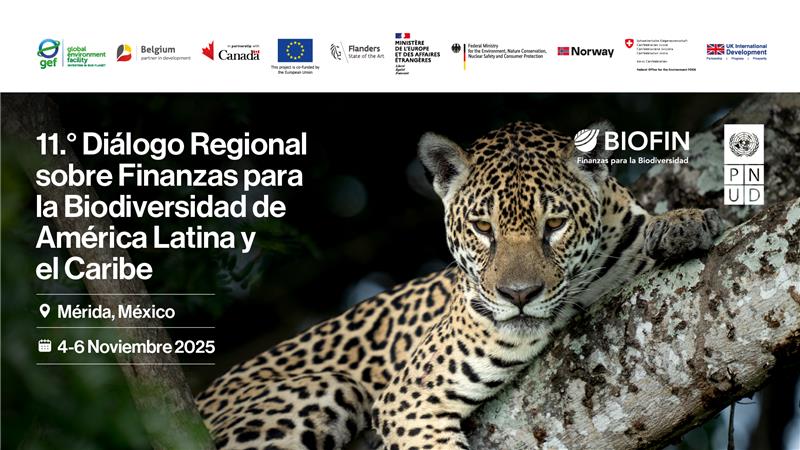
En la primera semana de noviembre, la región de América Latina y el Caribe será testigo de la mayor reunión de expertos en Financiamiento para la Biodiversidad de la región, que se reunirá en México para el 11º Diálogo Regional sobre Finanzas para la Biodiversidad de América Latina y el Caribe.
El evento, organizado por la Iniciativa BIOFIN del Programa de las Naciones Unidas para el Desarrollo, reunirá a más de 100 responsables políticos, líderes gubernamentales y expertos en finanzas de 28 países de la región.
Aquí hay cinco temas clave que se explorarán durante el diálogo:
- Seguro de protección del jaguar: un mecanismo que salva a los depredadores y los medios de vida
Qué es: Un esquema de seguro que compensa a personas agricultoras por el ganado perdido por la depredación del jaguar, eliminando el incentivo económico para matar jaguares y creando incentivos para la coexistencia.
Por qué es importante: El conflicto entre humanos y vida silvestre es una gran amenaza para especies icónicas; compensar las pérdidas verificadas reduce las represalias y genera confianza con las comunidades rurales. El piloto de Misiones de Argentina es el primer ejemplo del mundo y muestra cómo los alianzas entre el sector público, privado y ONG pueden diseñar seguros prácticos y adaptados localmente.
A qué prestar atención en el diálogo: mecanismos de verificación, cómo se financian las primas y reclamaciones (subsidio público frente a financiamiento híbrido) y vínculos con la restauración del hábitat o el ecoturismo para crear incentivos a largo plazo.
- Abordando subsidios dañinos: reorientar el dinero público lejos de la pérdida de biodiversidad
Qué es: Identificación, evaluación y reforma sistemáticas de subsidios e incentivos que dañan la biodiversidad (por ejemplo, ciertos subsidios agrícolas, energéticos o de agua), además de reutilizarlos para obtener resultados positivos.
Por qué es importante: Los subsidios que fomentan la extracción excesiva o la conversión intensiva de tierras son una causa fundamental de la pérdida de biodiversidad; la reforma libera espacio fiscal y evita resultados perversos. El trabajo de BIOFIN en Colombia ha mapeado los impulsores y está avanzando en una vía de reforma concreta para redirigir los incentivos dañinos en sectores productivos clave.
Qué observar en el diálogo: enfoques de economía política que hacen factible la reforma, secuenciación (priorización de reformas piloto) y formas de medir los impactos fiscales y de biodiversidad.
- Crowdfunding como una ruta ágil hacia la acción comunitaria y en campo (Cuba, Costa Rica, Ecuador)
Qué es: Campañas y plataformas de pequeños donantes que recaudan fondos rápidos para proyectos comunitarios específicos, desde el monitoreo de especies en peligro de extinción hasta la reforestación y el apoyo a los medios de vida locales.
Por qué es importante: El crowdfunding puede financiar la conservación de base, crear propiedad de las partes interesadas y proporcionar ganancias rápidas y visibles que complementan los instrumentos de financiación más grandes. Las campañas apoyadas por BIOFIN (por ejemplo, la campaña de reforestación de Costa Rica) muestran cómo el crowdfunding puede generar sumas significativas e impulso social.
A qué prestar atención en el diálogo: cómo diseñar campañas que protejan los derechos y la distribución de beneficios (especialmente con grupos originarios y liderados por mujeres), integrar el crowdfunding en planes financieros nacionales y escalar pequeños éxitos sin perder el control local.
- 10 años de BIOFIN en México: lecciones, tracción y próximos pasos
Qué es: Una década de apoyo de BIOFIN ha ayudado a los países a diseñar planes de financiamiento de biodiversidad, pilotear soluciones y desarrollar capacidad institucional; México es uno de los países donde este trabajo tiene raíces profundas.
Por qué es importante: Diez años de práctica nos dan evidencia sobre lo que funciona: cómo los planes de financiamiento traducen las políticas en proyectos, cómo movilizar financiamiento híbrido y cómo rastrear los gastos en biodiversidad. El hito de 10 años es una oportunidad para reflexionar sobre el impacto y acelerar la ampliación.
Qué observar en el diálogo: qué soluciones de BIOFIN han sido más duraderas en México, lecciones sobre la participación nacional y oportunidades para replicar instrumentos exitosos a nivel regional.
- Financiamiento de triple ganancia: instrumentos que benefician a la naturaleza, los presupuestos públicos y la igualdad de género
Qué es: Las soluciones de "triple ganancia" diseñan el financiamiento de manera intencional para brindar resultados positivos para la biodiversidad, la resiliencia fiscal/financiera y la equidad de género (por ejemplo, financiamiento de empresas verdes dirigidas por mujeres o fondos que vinculan los medios de vida de las mujeres a la restauración).
Por qué es importante: La integración de objetivos sociales y de género aumenta la legitimidad, la eficacia y el alcance, y a menudo descubre beneficios colaterales para la reducción del clima y la pobreza. Los planes de país de BIOFIN y el PNUD muestran cómo el pensamiento de "triple ganancia" hace que las finanzas pasen de proyectos de un solo tema a un cambio hacia sistemas inclusivos.
A qué prestar atención en el diálogo: métricas para medir los resultados de género junto con los impactos ecológicos y fiscales, y vehículos financieros (donaciones + financiamiento concesional + asistencia técnica) que se centran en las mujeres y otros grupos marginados.
Categories
Archives
- Febrero 2026 (1)
- Enero 2026 (3)
- Diciembre 2025 (2)
- Noviembre 2025 (5)
- Octubre 2025 (5)
- Septiembre 2025 (2)
- Agosto 2025 (10)
- Julio 2025 (9)
- Junio 2025 (5)
- Mayo 2025 (8)